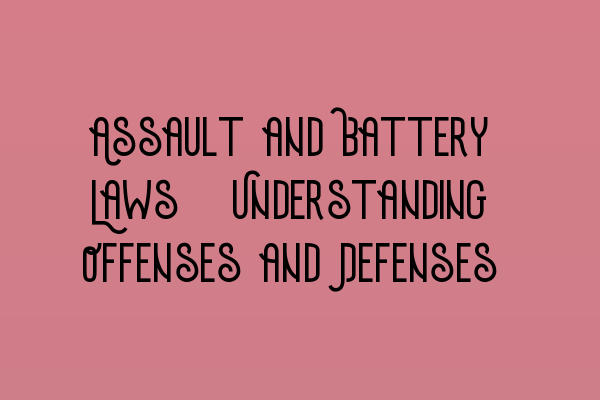Assault and Battery Laws: Understanding Offenses and Defenses
As experienced criminal defense solicitors at SQE Criminal Law & Practice Law UK, we understand the complexities of assault and battery laws. These offenses can have severe consequences, both for the accused and the victim. In this blog, we aim to provide you with a clear understanding of assault and battery offenses, as well as the possible defenses that can be employed.
What is Assault?
Assault is a criminal act that involves the intentional, apprehensive fear of harmful or offensive contact without actual physical contact occurring. It is important to note that assault does not require any form of physical contact, as the fear or threat alone is sufficient to constitute the offense. If you want to test your knowledge and challenge yourself, you can try our SQE 1 Practice Exam Questions.
There are different types of assault offenses, including simple assault, aggravated assault, and assault causing grievous bodily harm. Each offense carries varying degrees of severity and potential penalties.
Battery: The Act of Physical Contact
Battery, on the other hand, involves the intentional and unlawful physical contact with another person. Unlike assault, battery requires actual physical contact to occur. The physical contact can be harmful, offensive, or even sexual, and the severity of the offense depends on the nature and extent of the contact. You may want to explore our SQE 1 Practice Mocks FLK1 FLK2 for more comprehensive preparation.
Defenses Against Assault and Battery Charges
If you have been accused of assault or battery, it is crucial to understand the possible defenses that can be used to challenge the charges against you. Some common defenses include:
- Self-defense: If you can demonstrate that you acted in self-defense, fearing imminent harm or danger, it may be a valid defense.
- Consent: In certain circumstances, if the alleged victim consented to the contact or willingly participated, the defense of consent can be raised.
- Lack of intent: If you can prove that you did not have the intention to cause harm or offensive contact, it may negate the charges.
- Mistaken identity: If you were mistakenly identified as the perpetrator, it can be a strong defense against assault or battery charges.
Keep in mind that each case is unique, and the appropriate defense strategy will depend on the specific facts and circumstances surrounding the offense. Engaging the services of an experienced criminal defense solicitor is essential to ensure your rights are protected and the best possible defense is mounted.
Preparation for SQE Exams
At SQE Criminal Law & Practice Law UK, we also provide comprehensive preparation courses for the Solicitors Qualifying Examination (SQE). Whether you are looking for SQE 1 or SQE 2 preparation courses, we have got you covered. Our courses are designed to equip aspiring solicitors with the necessary knowledge and skills to succeed in the exams. You can find more information about our SQE 1 and SQE 2 preparation courses on our website.
For those interested in the SRA SQE exam dates, we have compiled a handy guide that provides all the important dates and deadlines. It is crucial to stay updated with the exam schedule to ensure you are well-prepared and ready to tackle the assessments. You can find more information about SQE exam dates on our website.
We hope this blog post has provided you with valuable insights into assault and battery laws, as well as the possible defenses against these charges. If you require expert legal advice or representation, do not hesitate to contact SQE Criminal Law & Practice Law UK for professional assistance.
